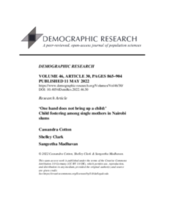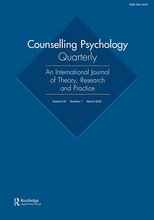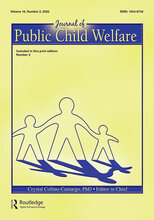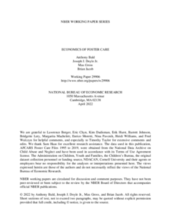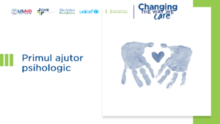Displaying 131 - 140 of 2221
Childrearing in sub-Saharan Africa is often viewed as collaborative, where children benefit from support from kin. For single mothers living in informal settlements, kin networks may be highly dispersed and offer little day-to-day childrearing support, but may provide opportunities for child fostering. This study conducted in Nairobi, Kenya, uses a linked lives approach, where single mothers’ connections with kin and romantic partners may influence whether – and what type of – kin are relied on to support child fostering.
The Task Force on Foster Care of the Transforming Children's Care Global Collaborative Platform held the second spotlight webinar series on identifying foster carers on 5 May 2022.
This paper describes a mixed methods approach that was applied to evaluate the complex intervention Fostering Connections: The Trauma-Informed Foster Care Programme, a recently developed trauma-informed psychoeducational intervention for foster carers in Ireland.
The purpose of this U.S.-based study was to determine whether children with developmental disorders (DDs) in protective custody are more likely to experience specific placement types and stay in care longer than their typically developing peers. Furthermore, in the DD-only group, the authors examined whether the likelihood of each placement type differed by specific DD diagnosis.
This chapter in the "Attachment-Informed Parent Coaching" book discusses how to use attachment-informed parent coaching to help children in foster care heal from the multiple layers of attachment trauma they have experienced. The author describes how to help children in foster care develop healthier relationships with both foster and biological parents.
The Task Force on Foster Care of the Transforming Children's Care Global Collaborative Platform held the first spotlight webinar series on foster care practice on 7 April 2022.
Many young people in foster care experience significant mental health difficulties, leading to attendance at services where engaging them in psychotherapy that adequately meets their diverse needs is an ongoing challenge. This Ireland-based study illuminates the inherent challenges of working with this population, while informing practice about how to engage with young people in foster care in a meaningful and helpful way.
This qualitative interview study assessed the pandemic’s impact on the educational experiences of foster youth in the United States from the perspectives of their caseworkers. Participant caseworkers discussed how the pandemic affected the academic progress and social/emotional development of youth in foster care and highlighted some challenges of online learning.
This paper describes tradeoffs in child welfare policy in the United States and provides background on the latest trends in foster care practice to highlight areas most in need of rigorous evidence. These trends include efforts to prevent foster care on the demand side and to improve foster home recruitment on the supply side. With increasing data availability and a growing interest in evidence-based practices, there are opportunities for economic research to inform policies that protect vulnerable children.
Această formare rapidă a fost concepută pentru a oferi informații familiilor de plasament (foster care) din Moldova în vederea pregătirii pentru plasamentul copiilor neînsoțiți și separați din Ucraina. Pachetul de formare include un PPT și un ghid al facilitatorului. Conținutul oferit în timpul programului de formare de șase ore include informații de bază despre traumele din copilărie, experiențele adverse din copilărie, elementele-cheie ale PFA, inclusiv "Privește, Ascultă și Leagă”, precum și înțelegerea modului în care se pot identifica și sprijini atât copiii care au trecut prin traume, cât și modul în care acestea se pot manifesta la diferite vârste și etape de dezvoltare.

